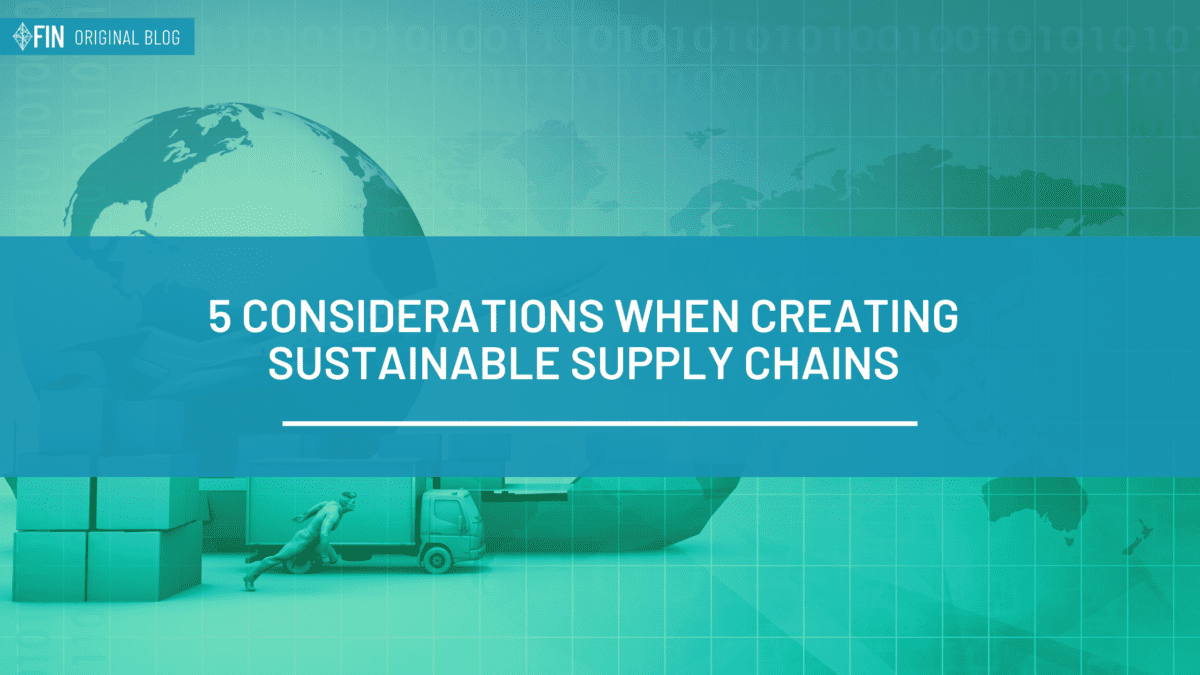There has never been more pressure from customers and stakeholders alike to commit to truly sustainable practices, and supply chains are at the center of this, whilst also trying to balance ongoing disruptions and rising costs.
With just eight major supply chains accounting for 50% of global emissions, and more than 90% of environmental damage caused by consumer goods supply chains, the pressure is on to make real changes, so our supply chains are not only sustainable but successful.
It’s easy for us to say ‘let’s stop talking and start doing’. The problem with this, is that increased pressure to say ‘you’re doing’, leads to greenwashing and cutting corners simply to tick a box, and without doing any real good.
So, let’s keep talking, and start doing. Because that is how we can hold each other accountable, and create real change.
Here are 5 considerations to keep in mind when creating sustainable supply chains.
Consider Routes
Supply chain involves movement, we know this. And that is a large contributing factor to previous poor sustainability track records.
Unfortunately, until electric or other more sustainable vehicles are available and affordable to use for worldwide shipments, the best way to minimize environmental impact is route optimization.
Creating shipment routes that are as optimized as possible, and eliminating unnecessary travel is a surefire way to make your supply chain more sustainable. Adopting technologies such as AI and advanced analytics can work with GPS’ to optimize routes and provide real-time updates to routes.
Take inventory of your supply chain
The difficulty with supply chain is the larger number of moving parts and stakeholders responsible for upholding sustainable practices.
The starting point for sustainability is mapping this out. If you don’t know what sustainable practices your suppliers have, how can you define yourself as a sustainable company? This is a collective effort.
Supply chain has become a household name, and consumers understand now more than ever that sustainability practices must be upheld all the way down the supply chain to truly be considered a sustainable business.
Once you know what supplier’s and stakeholder’s practices are, and only work with those that meet your standards so you can be assured that the right practices can be claimed consistently across the supply chain, can you be confident that every part of the contributing supply chain ecosystem upholds sustainable practices?
Leave no gaps
If containers and transportation vehicles aren’t fully utilized, you are creating waste. It is imperative we work with technology to optimize the capacity of containers etc, to reduce the travel and emissions attributed to each product.
Analytics forecasting the location of goods can help with this to assess what will be where and when to ensure full utilization of transportation is adopted, and measures to ensure this can be put in place.
Technology
As you can see from previous points, having the right technology is a huge benefit to sustainable supply chains.
Whether it’s AI, machine learning, IoT, or up-to-date analytics and reporting systems, utilizing the right technology provides greater visibility across the whole supply chain which makes it easier to identify areas that are substandard and thus implement sustainable practices.
Digital transformation of the supply chain is a journey that all supply chain leaders should be actioning for better transparency, sustainability, accuracy, and innovation end-to-end. Those that don’t will be left behind.
Benchmarking and Collaboration
The pace and scale of change the sustainable agenda demands cannot be easily achieved on your own. Knowledge sharing and collaboration are vital to benchmark against other companies and help the industry as a whole move to a greener future.
When supply chain leaders come together and collaborate on the biggest issue surrounding the industry, action can be taken and wider implementation of proper standards can be introduced which can make a wider impact than any individual effort.
This is why industry events are more important than ever before – hearing what leaders of the world’s biggest supply chains are actioning helps creates a precedent for others to follow suit.
Looking to operationalize supply chain sustainability? Join us on October 19th, in London, for a full day designated to benchmarking, knowledge sharing, and collaboration, led by world-leading experts on supply chain and sustainability. Find out more here.


